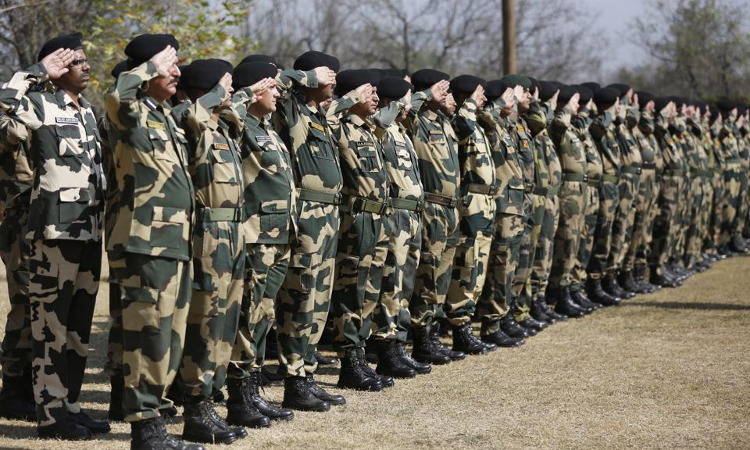- Home
- /
- High Courts
- /
- High Court of J & K and Ladakh
- /
- Compulsory Retirement Valid For...
Compulsory Retirement Valid For Leaving Battalion Without Informing About New Address, Employer Cannot Launch 'Manhunt' For Employee: J&K HC
Aleem Syeed
7 April 2025 7:25 PM IST
The Jammu and Kashmir High Court upheld the order of compulsory retirement from the service imposed upon the petitioner for his continuous absence from the battalion without permission for overstaying his leave for the period of 326 days.The petitioner, a CRPF constable, contended that the order issued by respondent No.3 was based upon an ex parte inquiry and that the petitioner has not...
The Jammu and Kashmir High Court upheld the order of compulsory retirement from the service imposed upon the petitioner for his continuous absence from the battalion without permission for overstaying his leave for the period of 326 days.
The petitioner, a CRPF constable, contended that the order issued by respondent No.3 was based upon an ex parte inquiry and that the petitioner has not been provided an opportunity of hearing and whatever notice was sent by the authority could not be received as he had changed his residential address owing to his ailment.
A bench of Justice Sanjay Dhar observed that “An employer is not expected to launch a manhunt for an absconding employee in the whole world. It is enough if an employer sends the communications to an absconding employee at his residential address. This is what has been done by the respondents as well as the Inquiry Officer in the present case. Therefore, it cannot be stated that the Inquiry Officer has not followed either the procedure prescribed under the CRPF Rules, or the principles of natural justice.”
The court said that the record suggested that the employer had meticulously adhered to the procedure for conducting the departmental inquiry, and since the petitioner had not informed the authorities, it was not possible for them to send notices on the said address.
The court also noted that the medical records produced by the petitioner did not suggest that he was suffering from such ailments which prevented him from communicating with the authorities, considering the fact that he was treated as an out-door patient and never hospitalized.
The petitioner had also contended that the respondent, being the revisional authority, could not have enhanced the punishment without the revisional application made by the member of the armed forces.
However, the court took note of Rule 29 of CRPF Rules, wherein it is was absolutely clear that the provisions contained in Rule 29 (d) of the CRPF Rules, vest suo moto and independent power upon the authorities mentioned therein to exercise revisional jurisdiction with a view to confirm, enhance, modify or annul the punishment imposed upon a member of the Force.
The petitioner has argued that punishment was disproportionate to the charge made against him however, the court noted that the petitioner was found absent from duty for a period of 326 days and he had no permission for overstaying his leave, nor was there any communication made by him to his employer during the course of the stay till the order dismissal was passed against him.
The court refused to interefere with the decision for his dismissal citing State of Meghalaya vs. Mecken Singh N. Marak wherein Supreme Court held that the discretion vests with the Disciplinary Authority to impose punishment commensurate with the nature of offence proved and the same cannot be interfered with by the Court.
BACKGROUND
The petitioner, who was serving as a Havaldar in the CRPF, challenged the order of compulsory retirement from the Armed Force and another order whereby his reinstatement was set-aside by the respondent no.3.
He had gone on a five-day leave starting 09.05.2016 but couldn't return on time due to health issues. During his illness, he moved from his registered hometown in Chhindwara, Madhya Pradesh to another area within the district for treatment. While he was still unwell, he was dismissed from service on 04.04.2017 by the Commandant of his battalion.
Petitioner appealed against this decision, and the appellate authority (respondent No.4) reinstated him on 09.02.2018, reducing the punishment to stoppage of two annual increments.
The Respondent No.3 overturned it on 12.07.2018, reinstating the original dismissal. The petitioner then approached respondent No.2, who found fault with the process and sent the matter back to respondent No.3, asking him to follow proper procedure by issuing a show-cause notice and passing a detailed order.
After issuing a notice and reviewing the petitioner's response, respondent No.3 again punished the petitioner but with compulsory retirement instead of dismissal.
The petitioner has argued that this was unfair for as he wasn't properly informed about the departmental inquiry, the punishment was too harsh for what he did, and that respondent No.3 didn't have the legal authority to act suo moto to increase the punishment. He also pointed out that his offence of overstaying leave was not serious enough to warrant such a severe penalty.
On the other hand, the authorities say that all due process as per CRPF Act was followed. Respondent argued that petitioner ignored multiple reminders to return, was declared a deserter, and never responded to official communications, which forced them to proceed with an ex-parte inquiry.
APPEARANCE:
Manik Gupta, Advocate For Petitioner
R.S.Jamwal CGSC. For Respondents
Case-Title: HC/GD Harish Chander vs UOI and others
Citation: 2025 LiveLaw (JKL) 139



